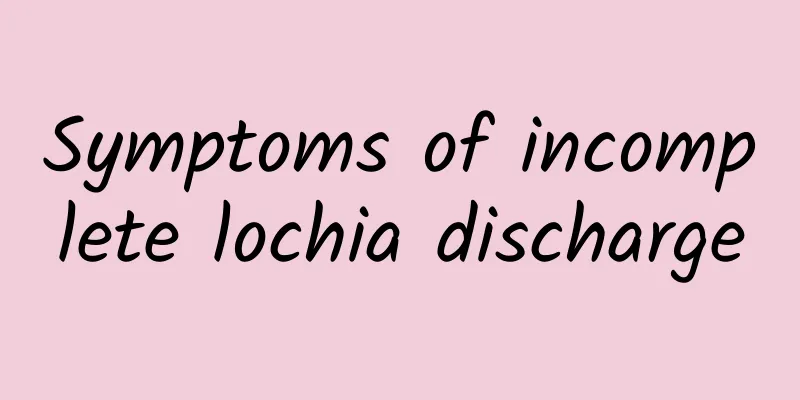Symptoms of incomplete lochia discharge

|
No matter whether women give birth naturally or by caesarean section, they will have lochia for a period of time. Generally, the lochia is the heaviest in the first few days after delivery and is bright red in color. After about 3-4 days, the lochia becomes lighter in color. After about 2 weeks, the lochia turns light yellow and lasts for 2-3 weeks. In short, the lochia should stop when it is one month after delivery. Whether lochia is completely discharged is related to women's physical health and the recovery of the uterus after childbirth. Therefore, it is very important to understand the symptoms of incomplete lochia discharge. If the uterus does not recover well, or if there is residual placenta, fetal membrane or infection in the uterine cavity, the following symptoms may occur: 1. The duration of lochia discharge is prolonged; 2. The lochia has a foul odor, and there may even be a fever or chills; 3. 4 days after delivery, the lochia is still bright red; 4. If bright red blood spots appear again after the lochia has become lighter, it means you need to rest well. If blood spots still appear after a day of rest, you should go to the hospital for treatment. 5. Increased lochia, even abnormally high bleeding, or large blood clots, indicate postpartum hemorrhage and require immediate medical treatment; How to treat postpartum lochia 1. Keep the perineum clean Due to the discharge of lochia, postpartum mothers need to change sanitary napkins frequently, use warm water to clean the vulva every day, prohibit sitting baths and tub baths, keep fresh and dry, and it is best to temporarily prohibit sexual intercourse to reduce the occurrence of infection. 2. Continue breastfeeding When the baby sucks the nipple, it can stimulate the contraction of the uterus, thereby accelerating the recovery of the uterus. It is advisable to let the baby eat breast milk as soon as possible after delivery and insist on breastfeeding, which is conducive to the contraction of the uterus and the discharge of lochia. 3. Get some rest Those who have not stopped lochia should pay attention to bed rest, avoid emotional excitement, and keep a good mood. At the same time, pay attention to keeping the indoor air circulating and keep warm to prevent the mother from catching cold. When the lochia decreases and the body tends to recover, you can get up and move around appropriately, which is beneficial to the circulation of qi and blood and the discharge of residual turbidity in the uterus. 4. Enhance nutrition The diet needs to be light to enhance nutrition and strengthen the physical fitness; avoid raw and cold fruits and extremely cold foods to avoid blood stagnation; avoid spicy and irritating foods to avoid generating heat and aggravating bleeding; avoid greasy foods to avoid damaging the spleen and stomach; to avoid warm foods from helping evil, eat more fresh vegetables. Those with qi deficiency can drink more chicken soup, longan soup, etc.; those with hot blood can eat more fruits such as lotus root, pear, orange, watermelon, etc., but it is best to take them warm. Recommended recipe: Millet, egg and brown sugar porridge 100 grams of fresh millet, 3 eggs, and appropriate amount of brown sugar. After the millet is boiled, change to low heat and simmer until it becomes porridge. Then beat the eggs in the porridge, stir well, cook it for a while, add brown sugar and it is ready to eat. It nourishes the spleen and stomach, replenishes qi and blood, and activates blood circulation. It is suitable for consumption for symptoms such as postpartum weakness, dry mouth and thirst, and retained lochia. Recommended recipe: Hawthorn brown sugar drink Take 30 grams of large, fleshy fresh hawthorn and 30 grams of brown sugar. Wash the hawthorn, cut into thin slices and dry them; cook the hawthorn over high heat until it is well cooked, then add brown sugar and cook for a while. It can promote digestion and disperse blood stasis, and can help postpartum women with persistent lochia to dissolve blood stasis faster and expel the lochia. |
<<: What are the symptoms of hand weakness?
>>: What are the symptoms of tooth swelling?
Recommend
What does lip and tongue inflammation look like?
The lips and tongue are very important tissues in...
What is the treatment for otolithiasis?
Many friends have not heard of the disease called...
Steam fish with hot or cold water
When steaming fish, you need to use hot water, be...
Itchy asshole and bloody stool
Many people develop hemorrhoids due to bad eating...
What happens when acne turns into hard bumps?
Some people find that some of the acne on their f...
Causes of peeling around fingernails
We will find that the skin around our fingernails...
What department should I go to to see moisture?
Everyone has moisture in their body. The moisture...
TCM Methods for Treating High Blood Sugar
High blood sugar is a common disease. If you have...
How to treat spinal ligament inflammation and what should we pay attention to?
Spinal ligaments are connecting tissues between t...
Sequelae of cesarean section anesthesia
Cesarean section is a relatively common method of...
How to quickly eliminate blood stasis in the head
Because the brain is hit and bruised, it will cau...
Only when a man gives up this thing can his wife be satisfied
Be firm in your belief and quit smoking as soon a...
How to treat spontaneous pneumothorax? What are the conservative treatment methods for pneumothorax?
The pleural cavity is a closed potential space th...
Itchy palate, sneezing, runny nose
The upper palate is often prone to dryness or ulc...
Can moxibustion reduce inflammation?
Many people often feel this situation in their li...









